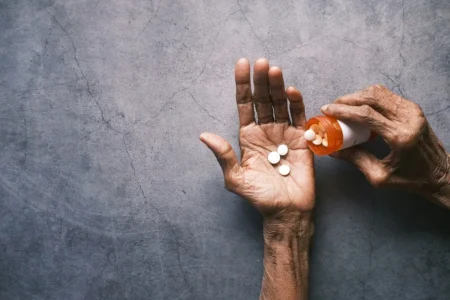Fertility Issues Men Face in Modern Society & Why It Matters?
- Updated on: Feb 29, 2024
- 4 min Read
- Published on Dec 2, 2022

Male infertility is often considered a taboo in Indian society. It is hard for men to talk about it with their friends, let alone their spouse or family. Many men suffering from infertility have their masculinity questioned or ridiculed.
Most of these men turn to performance booster supplements without first consulting with their doctors. And when they don’t get the desired results, men become withdrawn. They believe that infertility is a source of embarrassment and inadequacy. That is why men have difficulty discussing infertility.
We must understand treating infertility is a delicate process. The endocrinologist’s or specialist’s treatment plan for infertility may include fertility drugs, immunity booster drinks, surgery, or even medical device implantations. In the end, it all depends on the diagnosis of the condition which is mostly avoided by men.
Fortunately, we are now in an era of recognition of the importance of such discussions which makes it easy to openly talk about male infertility issues. Although male infertility is not as prevalent as female infertility, it is still an issue that needs to be addressed. Let’s dive into some more information to learn about the graveness of this male problem.
The Modern Male Fertility Crisis: What You Need to Know!
Infertility has become a widespread problem among young Indians. A rising number of couples have been affected by infertility in recent years. It has been estimated that more than fifteen million couples in India struggle with infertility, making it a widespread issue. Male factors are the main cause of infertility in more than half of these cases. This indicates that approximately 15% of Indian men who are trying to get pregnant are infertile.
Intentionally delaying children is becoming more common among couples in the working world, in addition to the rising incidence of obesity and disease among women who are of reproductive age. Males now need more advanced reproductive technology due to this trend and the age-related loss in fertility.
So, What Exactly is Male Infertility?
Male infertility is the inability of a male to result in pregnancy in a fertile female. Male factor infertility is defined as a change in sperm concentration, motility, or morphology in at least one of two sperm analyses collected one and four weeks apart.
Male infertility is frequently caused by a lack of sperm, and sperm quality is used as a proxy for male fecundity. It accounts for 40-50% of fertility problems in humans and affects approximately 7% of all men.
What Factors Contribute to Male Infertility?
There are many reasons why men may have fertility issues, and they range from environmental factors to lifestyle choices.
Environmental Factors
The environment has been shown to affect sperm quality, especially when it comes to substances such as pesticides and heavy metals. These substances can lead to lower sperm count or motility rates which can then lead to infertility.
Lifestyle Choices
Lifestyle choices such as smoking, alcohol consumption, and drug use can also contribute to infertility in men. Smoking has been shown to decrease sperm motility rates by up to 30%. Alcohol consumption has also been shown to decrease fertility by decreasing testosterone levels as well as increasing oestrogen levels in the body which can lead to decreased sperm count or motility rates. Drug use can also lead to a decrease in fertility by increasing the number of sperm per ejaculation, which is often referred to as “sperm depletion”.
Health & Medical Conditions
Male infertility can be caused by several health and medical conditions. Oftentimes, men who suffer from these conditions are unaware of their effect on fertility until they have been diagnosed. Several genetic conditions, including Klinefelter’s syndrome, myotonic dystrophy, and malformed sperm syndrome, have an impact on male fertility. Health ailments such as diabetes, cystic fibrosis, inflammation of the testes, blocked or damaged sperm ducts, hormone imbalances, and decreased sperm production may cause difficulty in impregnating a female partner. Another medical condition that affects male fertility is called Azoospermia, this is when a man is unable to produce sperm cells,
Which Men Are More Susceptible to Infertility?
- Men with obesity or who are overweight.
- Age restricts the productivity of reproductive organs.
- Consumption of unhealthy products such as tobacco, liquor, or alcohol.
- Consuming heavy medications like cimetidine, cyproterone, etc.
- Bloodline issues
Male Infertility: What Treatments Are Available?
So far, we have understood male infertility is a common and complex issue. No question that getting older affects male sexual function, the parameters of sperm, and fertility. These alterations contribute to a decrease in fecundability, an increase in the time it takes to conceive a child, and an increase in the rate of spontaneous abortions.
If your infertility is caused by lifestyle factors such as smoking or working with certain chemicals, you may be able to reduce your risk. Discuss additional risk factors and what you can do about them with your healthcare provider.
Lifestyle Changes
- Maintain a healthy weight for your body
- Limit drinking and smoking
- Stop consuming drugs without a prescription
- Banana stem juice is high in vitamins A, B6, and C, potassium, and antioxidants, all of which can help males have more healthy sperm.
With the shift in males’ traditional attitudes toward infertility, the country is seeing the development of new male-specific fertility centres. For example, in December 2018, Androlife opened its doors in Hyderabad, India as the country’s first male fertility clinic. Thus, technological advancements in the field of male infertility diagnostics and therapeutics fuel market growth.
There are now many treatment options available to treat male infertility, depending on the cause, the following medical options may be used:
Medical Solutions
- Hormone therapy increases the number of sperm cells
- Artificial insemination is a process where sperm is collected, prepared, and inserted into the uterus or cervix of the woman.
- Intrauterine Insemination (IUI) involves depositing sperm inside the uterus near the egg with the goal of achieving fertilisation and pregnancy. If the sperm cannot be collected, frozen semen or a donor’s sperm could be used.
Conclusion
From the foregoing, it is clear that the diagnosis and treatment of the infertile male must be approached in a logical and orderly manner, with the goal of identifying and eliminating the causative factors.
Scientists and physicians are currently working on new therapeutic tools that, while not yet available, maybe just around the corner. It is only a matter of time before a true substitute for testosterone-releasing hormone is available to all male patients who require it.












